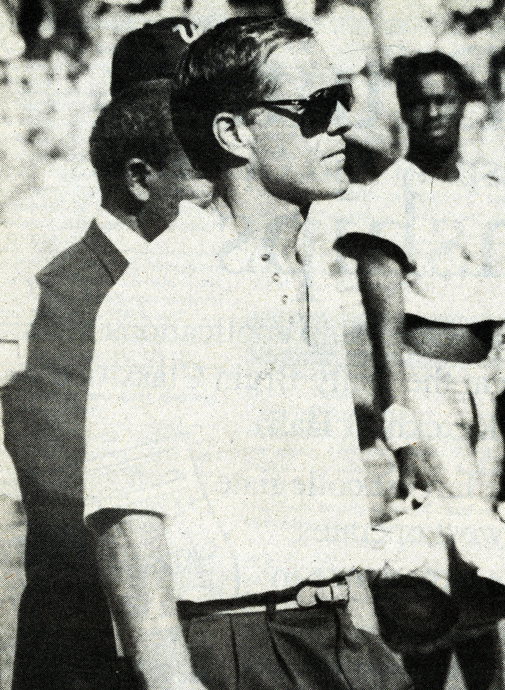The last time the athletic conference to which UCLA belongs decided to expand was in 1978, when the Pacific-8 Conference decided to become the Pacific-10 Conference by adding Arizona and Arizona State.
The coach of UCLA’s football team at the time was the legendary Terry Donahue, who coached the Bruins from 1976 to 1995 and is the winningest football coach in Pac-10 history. Donahue coached the Bruins to three Rose Bowl victories, five conference championships and seven consecutive bowl game victories from the 1982 to 1988 seasons.
After nearly 32 years of remaining at 10 teams, the Pac-10 grew on June 10 by adding the University of Colorado, and again on June 17 by adding the University of Utah.
The Daily Bruin’s Sam Strong spoke with Donahue to discuss the recent changes to the Pac-10 and what they mean for UCLA’s football program.
Daily Bruin: What are your thoughts on the recent expansion of the Pac-10? Is it good for the conference?
Terry Donahue: I think that you have to get to a point where you have a conference championship game because the money dictates that. The only way you can get there is to expand, in the Pac-10. You can’t get there any other way.
And so, expansion for the Pac-10, I think, became a necessity when you look at the things that occurred like championship games like in the Big 12, that sort of thing. And, network television for leagues like the Big Ten Network television. I think all of this is set up as a prelude to a TV network for the Pac-10 which is going to be a very good thing and I think a championship game which I also think will be a very good thing, monetarily.
If you just look at the numbers, if you’re in a league like the Pac-10, and these are rough estimates, you probably get $6 million a team for all of your television rights and all that kind of stuff, and if you’re in a conference like the Big 10, you probably get $20 million. Well, you can imagine how critical that difference in revenue is for supporting all the other sports within your program and doing all the different things that you want to do as an athletics department. It’s really, I think, an opportunity financially to do some great things, and the addition of Colorado and Utah enables them to do that.
DB: What are your thoughts, specifically, on the addition of Colorado and Utah as programs? Do they strengthen the conference?
TD: Just as when Arizona and Arizona State came in, they upgraded the conference. They made the competition stiffer. The addition of Utah and Colorado will make the competition in the Pac-10 stiffer. You sell a lot of things in recruiting. One of the many things you sell is your league.
When Utah is in a different league than the Pac-10, they can’t come in and effectively beat UCLA or USC or Washington consistently or those kinds of athletes in Pac-10 territory because (the other teams) can always play the card against Utah by saying, “They’re not in as good of a league and if you want to play the top competition in the country, come to the Pac-10.” Well, that all goes away now that Utah joined. The same with Colorado. You sell against the Big 12 and you push the Pac-10. Those advantages go away, so Colorado and Utah in any Pac-10 territorial region right now will have a much better opportunity to get players that they haven’t had in the past.
DB: There’s been a lot of talk about these six team divisions and how they’re going to split up the conference. A lot of people are talking about some of the northern schools not being able to play UCLA and USC every year. What are your thoughts on that and have you heard anything in that regard?
TD: I don’t have a lot of thoughts on that because, honestly, I don’t know. I don’t know how they’re going to split the conference up and how that’s going to work out. I just don’t have any real clue of how that might shake out and work itself out.
I think that’s one of the difficulties. I think that it would have been a much easier presentation or formation of leagues and things like that if Texas and Oklahoma and those other Big 12 schools had come in. But, they didn’t, and so I think it’s going to be a little more difficult for the conference to decide how they’re going to realign themselves but I’m sure that they’ll do it and it will be interesting and entertaining.
DB: How do you think this affects UCLA and coach Neuheisel’s program?
TD: I think it will make it harder on UCLA just like Arizona and Arizona State made it harder on me when they came into the league. And I think it will make it harder because you’ve got two more teams, and it’s going to make UCLA step it up and have to compete with two very good universities that have good football programs. The last time UCLA played Utah, it wasn’t pretty so I think it will make it harder.
But UCLA has a lot of advantages. We’ve got a great academic school, we’ve got an outstanding head coach, we’ve got quality players, we’re in a great area and that’s part of it. You have to be willing to compete and able to compete at that level and UCLA certainly has proven that they can and they will again in the future. It will make it harder because again, Utah and Colorado will gain some recruiting advantages, not over UCLA, but recruiting advantages over where they had been in different leagues, now they’ll be in the same league as UCLA so that disadvantage will disappear.
